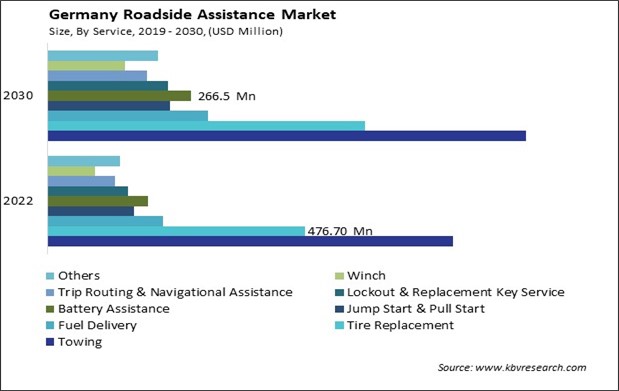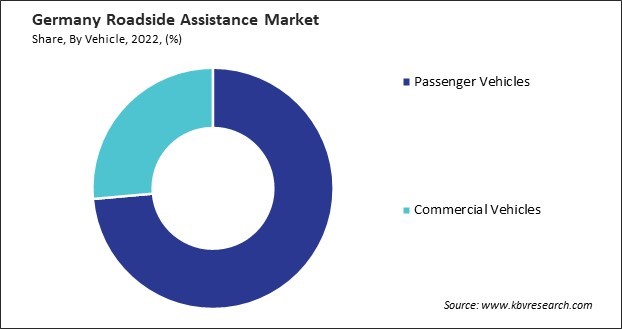Germany Roadside Assistance Market Size, Share & Trends Analysis Report By Service, By Vehicle (Passenger Vehicles, and Commercial Vehicles), By Provider (Motor Insurance, Independent Service Provider, OEM, and Others), Outlook and Forecast, 2023 - 2030
Published Date : 26-Mar-2024 |
Pages: 60 |
Formats: PDF |
COVID-19 Impact on the Germany Roadside Assistance Market
The Germany Roadside Assistance Market size is expected to reach $3 billion by 2030, rising at a market growth of 3.3% CAGR during the forecast period.
The roadside assistance market in Germany is a robust and highly competitive industry that plays a crucial role in ensuring the safety and well-being of motorists across the country. With Germany being a nation that prides itself on its well-developed road infrastructure and a significant reliance on automobiles, the demand for roadside assistance services has seen a consistent and growing trend.

Furthermore, the German industry has shifted towards digitalization in recent years, with many roadside assistance providers offering mobile applications and online platforms to enhance customer accessibility. This digital transformation enables users to request assistance, track service vehicles in real-time, and receive updates on their service request status, improving overall customer satisfaction.
The roadside assistance market in Germany has evolved to offer a spectrum of services, including vehicle towing, battery assistance, tire changes, and fuel delivery. Service providers are leveraging advanced technologies and mobile applications to enhance the efficiency of their operations, ensuring a rapid response to customer needs.
Market Trends
Increase In Vehicle Ownership
The roadside assistance market in Germany has witnessed a substantial surge in recent years, primarily attributed to a notable increase in vehicle ownership across the country. This trend indicates the evolving automotive landscape in Germany, where more individuals are investing in personal vehicles, contributing to the growing demand for roadside assistance services.
Germany, renowned for its robust automotive industry, has experienced a steady rise in car ownership fueled by economic prosperity, improved living standards, and a preference for individual mobility. As more German residents acquire vehicles for personal and professional use, reliable roadside assistance has become increasingly crucial. Moreover, urbanization has led to changes in commuting patterns, prompting more individuals to opt for personal vehicles for convenience and flexibility. This shift has propelled the demand for roadside assistance market as people seek assurance that they receive prompt support in case of breakdowns or emergencies.
According to the Germany Trade & Invest in 2021, German original equipment manufacturers (OEMs) demonstrated their commitment to research and development (R&D) by investing nearly EUR 28.3 billion. Remarkably, the automotive sector emerged as Germany's most innovative industry, constituting 34.1 percent of the nation's total industry R&D spending, which reached approximately EUR 71 billion in 2020. Notably, this strong emphasis on innovation indicates the industry's proactive approach to adapting to evolving trends.
Against this backdrop, it is essential to recognize that the surge in R&D investments aligns with the German automotive industry's strategic focus on electric mobility and digitalization. Over the period from 2022 to 2026, manufacturers and suppliers in this sector are poised to channel more than EUR 220 billion into initiatives related to electric vehicles and digital advancements. This forward-looking investment strategy positions Germany as a key player in shaping the future of the automotive landscape.
As the German automotive industry gears up for a transformative period, it is anticipated that the increased emphasis on electric mobility inevitably influence the dynamics of the vehicle ownership landscape. One notable impact is the anticipated rise in the ownership of electric vehicles, leading to an evolution in the roadside assistance market in Germany. With a growing fleet of electric vehicles on the roads, there is a heightened demand for specialized roadside assistance services tailored to the unique needs of electric mobility. Hence, the surge in vehicle ownership in Germany has driven a substantial increase in the roadside assistance market, reflecting the evolving automotive landscape.
Roadside Assistance Providers Offer Subscription-Based Services
In Germany, the roadside assistance market has witnessed a significant surge in subscription-based services offered by specialized providers. These services cater to the diverse needs of motorists, providing timely and efficient assistance in vehicle breakdowns, accidents, or other roadside emergencies. German motorists, renowned for their affinity towards quality and reliability, are increasingly opting for subscription-based roadside assistance plans to ensure peace of mind during their journeys. Providers in this industry offer a range of subscription packages, allowing customers to choose plans that align with their specific requirements and preferences.
One key aspect that sets Germany apart in the roadside assistance landscape is the emphasis on premium services. German consumers often prioritize high-quality and comprehensive assistance, leading to the popularity of subscription plans that go beyond basic towing services. Premium packages may include services such as on-the-spot repairs, fuel delivery, and even accommodation assistance in case of extended breakdowns. The competitive nature of the German roadside assistance market has prompted providers to differentiate themselves by offering additional perks within their subscription plans. These may include priority service, faster response times, and exclusive partnerships with local service centers and repair shops. Such added benefits enhance the overall value proposition for subscribers.
Furthermore, the geographical diversity of Germany, with its extensive highway network and rural areas, has driven the demand for subscription-based roadside assistance. Motorists value the assurance of prompt support, especially when traveling through less densely populated regions where help may be less readily available. Thus, the rise of subscription-based roadside assistance services in Germany reflects the discerning preferences of motorists who prioritize premium and comprehensive solutions.

Competition Analysis
Germany's roadside assistance market is characterized by a mix of established automobile clubs, insurance companies, and emerging technology-driven platforms, all working to provide efficient and reliable assistance to drivers in need. ADAC (Allgemeiner Deutscher Automobil-Club) is one of Germany's largest and most well-known automobile clubs, providing a comprehensive range of roadside assistance services. With millions of members, ADAC offers towing, flat tire assistance, battery service, and emergency fuel delivery services. The club's extensive network of service providers ensures nationwide coverage.
ACE (Auto Club Europa) is another significant player in Germany's automobile club landscape. ACE offers roadside assistance services, including towing, breakdown assistance, and other emergency services. ACE caters to the needs of its members and aims to provide quick and efficient support on the road. Similarly, Europcar, a prominent car rental company in Germany, offers roadside assistance services to its rental customers. This includes services such as towing, vehicle replacement, and other support in case of breakdowns or accidents during the rental period.
Bosch, a leading global technology and services provider, offers roadside assistance solutions through its Service Solutions division. Bosch provides technical support, coordination of roadside assistance services, and digital solutions for various automotive service providers and insurers in Germany. These entities collectively ensure that drivers access prompt, reliable assistance in emergencies, reflecting Germany's commitment to automotive safety and support services.
List of Key Companies Profiled
- Agero, Inc. (The Cross Country Group, LLC.)
- Falck A/S
- Paragone Motor Club, Inc.
- SOS International A/S
- Viking Assistance Group (P&C Insurance Holding Ltd.)
- ARC Europe SA
- Chubb Limited
- Allianze SE
- Prime Assistance Inc. (Sompo Holdings)
Germany Roadside Assistance Market Report Segmentation
By Service
- Towing
- Tire Replacement
- Fuel Delivery
- Jump Start & Pull Start
- Battery Assistance
- Lockout & Replacement Key Service
- Trip Routing & Navigational Assistance
- Winch
- Others
By Vehicle
- Passenger Vehicles
- Commercial Vehicles
By Provider
- Motor Insurance
- Independent Service Provider
- OEM
- Others
1.1 Market Definition
1.2 Objectives
1.3 Market Scope
1.4 Segmentation
1.4.1 Germany Roadside Assistance Market, by Service
1.4.2 Germany Roadside Assistance Market, by Vehicle
1.4.3 Germany Roadside Assistance Market, by Provider
1.5 Methodology for the research
Chapter 2. Market Overview
2.1 Introduction
2.1.1 Overview
2.1.1.1 Market Composition and Scenario
2.2 Key Factors Impacting the Market
2.2.1 Market Drivers
2.2.2 Market Restraints
2.3 Porter’s Five Forces Analysis
Chapter 3. Germany Roadside Assistance Market
3.1 Germany Roadside Assistance Market by Service
3.2 Germany Roadside Assistance Market by Vehicle
3.3 Germany Roadside Assistance Market by Provider
Chapter 4. Company Profiles – Global Leaders
4.1 Agero, Inc. (The Cross Country Group, LLC.)
4.1.1 Company Overview
4.1.1 SWOT Analysis
4.2 Falck A/S
4.2.1 Company Overview
4.2.2 Financial Analysis
4.2.3 Segmental and Regional Analysis
4.2.4 SWOT Analysis
4.3 Paragone Motor Club, Inc.
4.3.1 Company Overview
4.4 SOS International A/S
4.4.1 Company Overview
4.4.2 Financial Analysis
4.4.3 Segmental and Regional Analysis
4.4.4 SWOT Analysis
4.5 Viking Assistance Group (P&C Insurance Holding Ltd.)
4.5.1 Company Overview
4.5.2 SWOT Analysis
4.6 ARC Europe SA
4.6.1 Company Overview
4.6.2 SWOT Analysis
4.7 Chubb Limited
4.7.1 Company Overview
4.7.2 Financial Analysis
4.7.3 Segmental and Regional Analysis
4.7.4 SWOT Analysis
4.8 Allianze SE
4.8.1 Company Overview
4.8.2 Financial Analysis
4.8.3 Recent strategies and developments:
4.8.3.1 Partnerships, Collaborations, and Agreements:
4.8.4 SWOT Analysis
4.9 Prime Assistance Inc. (Sompo Holdings)
4.9.1 Company Overview
TABLE 2 Germany Roadside Assistance Market, 2023 - 2030, USD Million
TABLE 3 Germany Roadside Assistance Market by Service, 2019 - 2022, USD Million
TABLE 4 Germany Roadside Assistance Market by Service, 2023 - 2030, USD Million
TABLE 5 Germany Roadside Assistance Market by Vehicle, 2019 - 2022, USD Million
TABLE 6 Germany Roadside Assistance Market by Vehicle, 2023 - 2030, USD Million
TABLE 7 Germany Roadside Assistance Market by Provider, 2019 - 2022, USD Million
TABLE 8 Germany Roadside Assistance Market by Provider, 2023 - 2030, USD Million
TABLE 9 Key Information – Agero, Inc.
TABLE 10 Key Information – Falck A/S
TABLE 11 Key Information – Paragone Motor Club, Inc.
TABLE 12 Key Information – SOS International A/S
TABLE 13 Key Information – Viking Assistance Group
TABLE 14 Key Information – ARC Europe SA
TABLE 15 Key Information – Chubb Limited
TABLE 16 Key Information – Allianze SE
TABLE 17 Key Information – Prime Assistance Inc.
List of Figures
FIG 1 Methodology for the research
FIG 2 Germany Roadside Assistance Market, 2019 - 2030, USD Million
FIG 3 Key Factors Impacting Roadside Assistance Market
FIG 4 Porter’s Five Forces Analysis – Roadside Assistance Market
FIG 5 Germany Roadside Assistance Market Share by Service, 2022
FIG 6 Germany Roadside Assistance Market Share by Service, 2030
FIG 7 Germany Roadside Assistance Market by Service, 2019 - 2030, USD Million
FIG 8 Germany Roadside Assistance Market Share by Vehicle, 2022
FIG 9 Germany Roadside Assistance Market Share by Vehicle, 2030
FIG 10 Germany Roadside Assistance Market by Vehicle, 2019 - 2030, USD Million
FIG 11 Germany Roadside Assistance Market Share by Provider, 2022
FIG 12 Germany Roadside Assistance Market Share by Provider, 2030
FIG 13 Germany Roadside Assistance Market by Provider, 2019 - 2030, USD Million
FIG 14 SWOT Analysis: Agero, Inc.
FIG 15 SWOT Analysis: Falck A/S
FIG 16 SWOT Analysis: SOS International A/S
FIG 17 SWOT Analysis: Viking Assistance Group
FIG 18 SWOT Analysis: ARC Europe SA
FIG 19 SWOT Analysis: Chubb Limited
FIG 20 SWOT Analysis: Allianz SE